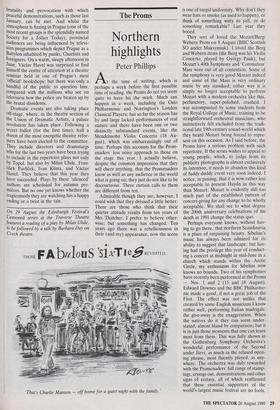The Proms
Northern highlights
Peter Phillips
t the time of writing, which is perhaps a week before the first possible time of reading, the Proms do not yet seem quite to have hit the mark. Much can happen in a week, including the Oslo Philharmonic and Norrington's London Classical Players; but so far the season has by and large lacked performances of real stature and there have been one or two distinctly substandard events, like the Mendelssohn Violin Concerto (18 Au- gust), which was embarrassingly out of time. Perhaps this accounts for the Prom- enaders' less noisy approach to those on the stage this year. I actually believe, despite the common impression that they will cheer anything, that the Promenaders know as well as any audience in the world what is going on; they just do not like to be discourteous. Three curtain calls to them are different from ten.
Admirable though they are, however, I could wish that they dressed a little better. There are those who think that their quieter attitude results from ten years of Mrs Thatcher. I prefer to believe other- wise; but something has changed. Ten years ago there was a rebelliousness in their (and my) appearance, now the scene
is one of turgid uniformity. Why don't they wear hats or smoke (as used to happen), or think of something witty to yell, or do something remarkable? Last year they booed.
They sort of loved the Mozart/Berg/ Webern Prom on 8 August (BBC Scottish SO under Maksymiuk). I loved the Berg and Webern items (the Berg was his Violin Concerto, played by Gyorgy Pauk), but Mozart's 40th Symphony and 'Coronation' Mass were out of all contention. Some of the symphony is very good Mozart indeed and some of the Mass is very ordinary music by any standard; either way it is simply no longer acceptable to perform Mozart with a modern orchestra like this, perfunctory, super-polished, crushed. I was accompanied by some students from the Royal College of Music, training to be straightforward orchestral musicians, who instinctively felt excluded from the tradi- tional late 19th-century sound-world which they heard Mozart being forced to repre- sent on this occasion. As I said before, the Proms have a serious problem with such repertoire. If the series wishes to appeal to young people, which, to judge from its publicity photographs is almost exclusively its intention, it needs to abandon this kind of fuddy-duddy event very soon indeed. I notice, in passing, that it is now rather less acceptable to present Haydn in this way than Mozart: Mozart is evidently still too much part of the established pattern of concert-giving for any change to be wholly acceptable. We shall see to what degree the 200th anniversary celebrations of his death in 1991 change the status quo.
Perhaps everyone knows, without hav- ing to go there, that northern Scandinavia is a place of surpassing beauty. Sibelius's music has always been admired for its ability to suggest that landscape; but hav- ing had the privilege this year of conduct- ing a concert at midnight in mid-June in a church which stands within the Arctic Circle, my enthusiasm for Sibelius now knows no bounds. Two of his symphonies have recently been performed at the Proms — Nos. 1 and 2 (15 and 18 August). Edward Downes and the BBC Philharmo- nic made a good, if not a great job of the First. The effect was not unlike that created by some English musicians I know rather well, performing Italian madrigals: the give-away is the exaggeration. When the natives do it they can seem under- stated, almost bland by comparison; but it is in just those moments that one can learn most from them. This was fully shown in the Gothenburg Symphony Orchestra's wonderful performance of the Second , under Jarvi, as much in the relaxed open- ing phrase, most fluently played, as any- where. The orchestra was duly rewarded with the Promenaders' full range of stamp- ings, cryings out, demonstrations and other signs of ecstasy, all of which reaffirmed , that these essential supporters of the world's largest music festival are no fools. ;










































 Previous page
Previous page